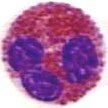eosinophils
 Eosinophils (acidophils) are granulocytes packed with granules that stain acidic (red with H&E). Eosinophils combat parasitic infection, and have diverse immune responsibilities.
Eosinophils (acidophils) are granulocytes packed with granules that stain acidic (red with H&E). Eosinophils combat parasitic infection, and have diverse immune responsibilities.
Eosinophils play roles in:
● combatting viral infections (RNAses)
● allergic response
● fibrinolysis (following inflammation).
● pathogenesis of asthma
● combatting helminthic colonization, other parasites.
The acidophilic granules contain proteolytic enzymes that are toxic to parasite and elicit allergic symptoms in the host. The enzymes include histaminase, peroxidase, RNase, DNases, lipase, plasminogen, and Major Basic Protein. Eosinophils also secrete IL-5.
Eosinophils normally comprises about 2.3% of leukocytes, and elevations (eosinophilia) are associated with parasitic infestation, collagen vascular diseases (such as rheumatoid arthritis), malignancies such as Hodgkin's lymphoma, allergic skin conditions (such as exfoliative dermatitis), Addison's Disease, and hypersensitivity to drugs such as penicillin.
Tables Fc receptors Immune Cytokines Immunoglobulins
tags [Immunology] [leukocyte]
